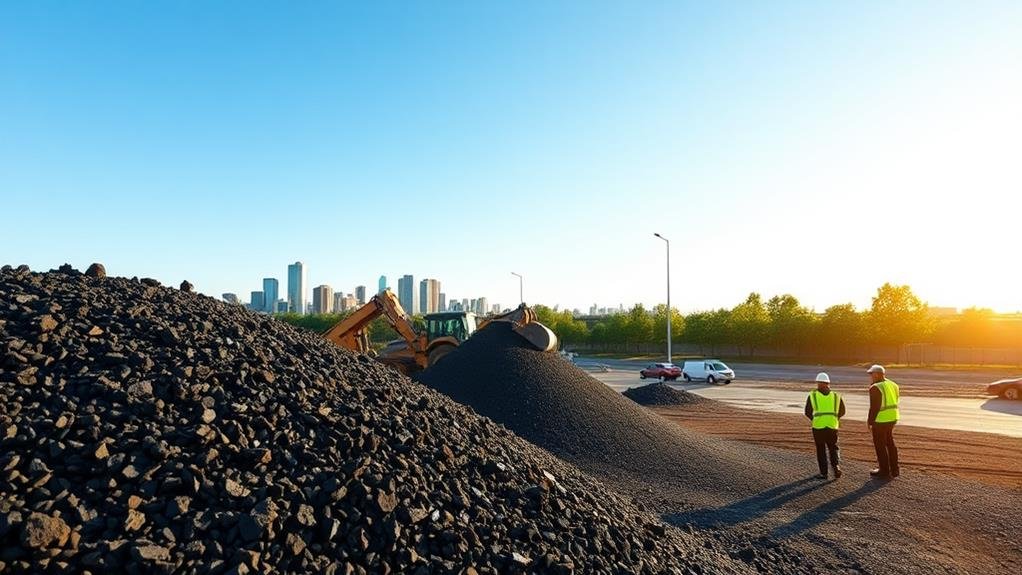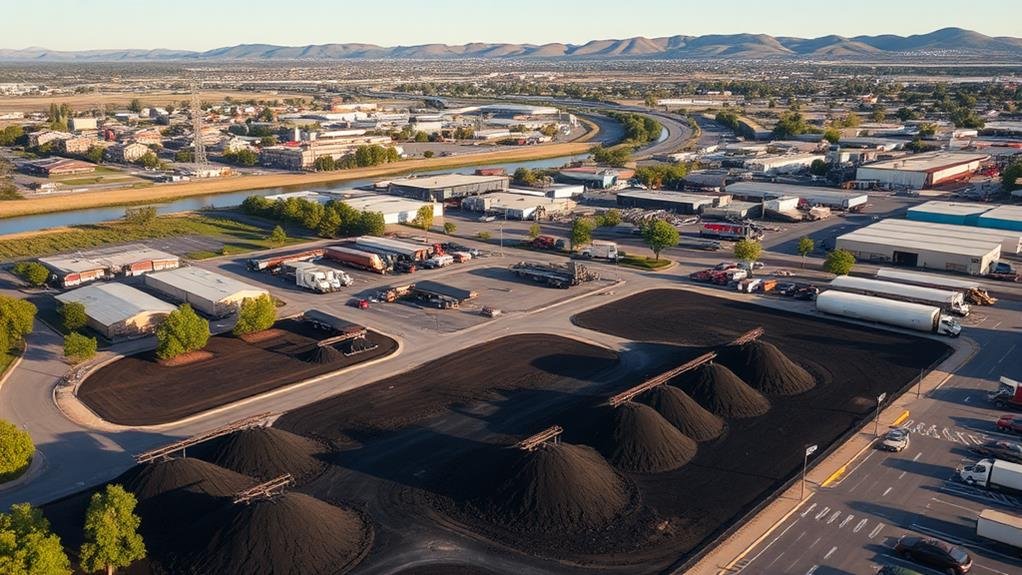Asphalt millings in Sacramento offer a cost-effective and environmentally friendly paving solution. You'll find these recycled materials used in driveways, parking lots, and roads throughout the city. Sacramento actively promotes their use, aligning with California's sustainability goals. By choosing asphalt millings, you can save up to 30% compared to traditional asphalt while contributing to reduced landfill waste and lower greenhouse gas emissions. The material's durability increases over time, requiring less maintenance than other options. Before starting your project, you'll need to comply with local regulations and obtain necessary permits. Exploring this sustainable option further reveals its full potential for your paving needs.
Benefits of Asphalt Millings

Why consider asphalt millings for your next paving project?
Asphalt millings offer a cost-effective and environmentally friendly solution that's gaining popularity in Sacramento.
You'll find significant savings compared to traditional asphalt, thanks to their recycled nature.
This budget-friendly option doesn't compromise on quality; in fact, the durability of milled asphalt increases over time, providing a weather-resistant surface that requires less maintenance than other materials.
Sacramento's Asphalt Recycling Initiatives

Leading the way in sustainable construction practices, Sacramento has embraced asphalt recycling initiatives that are transforming the city's approach to road maintenance and development.
You'll find that the city actively encourages the use of asphalt millings in local paving projects, which not only reduces costs but also minimizes the need for new asphalt production. This innovative approach focuses on reusing milled asphalt, greatly reducing waste and promoting sustainability in construction projects throughout the area.
As you explore Sacramento's roads and parking lots, you'll notice the versatility of asphalt millings. They're being used as base materials for various surfaces, showcasing their cost-effectiveness and adaptability.
Local contractors are increasingly adopting asphalt milling techniques, which enhance road quality while contributing to environmentally friendly practices in the construction industry. These initiatives are part of Sacramento's broader efforts to support sustainable infrastructure development, effectively reducing the environmental impact of road maintenance and construction activities.
Applications in Local Construction

Versatility defines the use of asphalt millings in Sacramento's local construction projects.
You'll find these recycled materials enhancing driveways, parking lots, and roads throughout the city. As a cost-effective alternative to traditional asphalt paving, millings offer durability and sustainability, aligning with Sacramento's environmental goals.
When you're considering a construction project, you'll appreciate the flexibility of asphalt millings. They're suitable for both residential and commercial applications, providing a range of textures to meet your specific needs.
Local contractors skillfully blend fine and coarse millings to achieve ideal surface characteristics, enhancing safety and functionality.
You'll notice significant cost savings when opting for asphalt millings. Their recycled nature reduces waste and lowers project expenses without compromising quality.
This makes them an attractive option for budget-conscious property owners and developers alike.
As you explore paving options in Sacramento, consider the widespread adoption of asphalt millings. They're transforming the local construction landscape, offering a sustainable, versatile, and economical solution.
Whether you're resurfacing a driveway or developing a commercial lot, asphalt millings provide a reliable and environmentally responsible choice for your project.
Cost-Effectiveness for Sacramento Projects

Three key factors make asphalt millings a cost-effective choice for Sacramento projects.
First, you'll benefit from significant savings due to the recycling of existing materials, which reduces the need for new asphalt. This process can lower project costs by up to 30% compared to traditional paving methods, making it an attractive option if you're working with a tight budget.
Second, the durability of milled asphalt surfaces results in reduced maintenance expenses over time. This long-term cost-effectiveness is particularly appealing for both residential and commercial projects in Sacramento, as you'll spend less on upkeep in the years following installation.
Lastly, the use of recycled materials in asphalt milling aligns with sustainability goals, which can be a selling point for environmentally conscious consumers in the Sacramento area.
This eco-friendly approach not only cuts costs but also enhances your project's appeal to a growing demographic of green-minded clients.
To get an accurate assessment of costs without hidden fees, you can take advantage of free quotes offered by Sacramento contractors for asphalt milling projects.
Environmental Impact in California

While cost-effectiveness is a major draw, asphalt millings also pack a powerful environmental punch in California. As California's Premier Contractors Offering asphalt services, Sacramento Asphalt Sealing recognizes the notable impact this material has on sustainability efforts.
You'll be pleased to know that approximately 95% of asphalt used in road construction is recyclable, drastically reducing the need for new materials.
By choosing asphalt millings for your projects, you're contributing to lower greenhouse gas emissions. The recycling process requires less energy than producing new asphalt, resulting in a smaller carbon footprint.
Additionally, you're helping to decrease landfill waste considerably. Millions of tons of asphalt are removed from roads annually, and instead of ending up in landfills, they're repurposed for new projects.
The durability of asphalt millings leads to longer-lasting road surfaces, which means fewer repairs and less environmental disruption from construction activities.
Comparing Millings to Traditional Materials

When it comes to pavement solutions, asphalt millings stand out as a game-changer compared to traditional materials. You'll find that these recycled asphalt products offer significant advantages over conventional options. Asphalt millings can save you up to 30% on project costs, making them a budget-friendly choice for your paving needs.
Unlike traditional asphalt, which requires new materials each time, millings promote sustainability by reusing existing resources. You'll appreciate the durability of asphalt millings, as they continue to harden and bind over time, outlasting traditional surfaces. This means less frequent maintenance and repairs for your pavement.
Weather resistance is another key benefit, with millings proving more resilient against temperature fluctuations and cracking. Additionally, you'll notice improved drainage capabilities, reducing the risk of pooling and erosion.
As a leader in Concrete Paving Services Since its inception, Sacramento Asphalt Sealing recognizes the value of asphalt millings. By choosing this innovative solution, you're not only saving money but also contributing to a more sustainable future. The superior performance and cost-effectiveness of millings make them an ideal choice for your next paving project.
Installation Techniques and Best Practices

For successful asphalt milling installation, proper techniques and best practices are indispensable.
You'll want to start by verifying the base layer is correctly graded to promote effective drainage and prevent water pooling, which can lead to surface damage. Before installation, it's essential to conduct a moisture content test on the milled asphalt. This step guarantees peak compaction and durability of the final surface.
When installing the asphalt millings, layer them in 2-3 inch increments. This approach helps achieve better compaction and a more stable surface. Use a heavy roller to compact the milled asphalt thoroughly. This process is crucial as it promotes a denser surface, enhancing longevity and reducing future maintenance needs.
After installation, it's recommended to apply a sealant to the milled surface. This protective layer shields the asphalt from weather damage and extends its lifespan.
Maintenance of Milling-Based Surfaces

Once you've installed your asphalt millings, maintaining them properly becomes your next priority. Regular inspections are vital to identify and address wear or damage, guaranteeing the longevity of your surface.
Class-A Licensed Specialists recommend sealing cracks and applying a maintenance seal coat every few years to enhance durability and appearance.
Proper drainage management is necessary for milling surfaces. You'll need to prevent standing water, which can lead to erosion or damage. Maintain adequate drainage systems to avoid these issues.
Over time, you may need to perform light grading or re-compacting, especially in high-traffic areas, to maintain a smooth and level finish.
Don't forget about routine sweeping and debris removal. These simple tasks prevent the accumulation of materials that can cause deterioration and enhance overall safety.
By following these maintenance practices, you'll extend the life of your milling-based surface and guarantee it continues to perform at its best.
Regulations and Permits in Sacramento

Maneuvering Sacramento's regulatory landscape is vital when undertaking asphalt milling projects.
You'll need to comply with local zoning regulations and the California Environmental Quality Act (CEQA) to guarantee environmental protection and community safety. If your project disturbs more than 50 cubic yards of soil, including the removal and reuse of asphalt material, you're required to obtain a grading permit.
Sacramento's noise ordinances are strict, particularly in residential areas, so you'll need to adhere to specific guidelines to minimize disturbances.
Proper waste management is essential; you must recycle or dispose of milled asphalt at approved facilities to comply with state waste regulations.
Before starting work, you'll need to provide proof of compliance with local air quality regulations, assuring that emissions from milling operations don't exceed limits set by the Sacramento Metropolitan Air Quality Management District.
Future of Asphalt Recycling

Looking beyond the current regulations, the future of asphalt recycling in Sacramento is bright and full of potential. As demand for sustainable paving solutions grows, you'll see an increased focus on reducing reliance on new asphalt materials. This shift will promote environmental stewardship while offering long-term value for your commercial property.
Innovations in technology, such as intelligent construction methods, are enhancing the efficiency and accuracy of asphalt recycling processes. These advancements will lead to better project outcomes, ensuring that specialists on your site can deliver top-quality results.
You'll find that the use of recycled asphalt millings is expanding, providing cost-effective alternatives for various applications, including road construction and maintenance. This trend adds value to your commercial property with class-A licensed paving solutions.
As legislative support for recycling initiatives increases, you can expect more municipalities and contractors to adopt asphalt recycling practices. This shift will make it easier for you to obtain a free quote for sustainable paving options.
Continuous improvements in recycling techniques will enhance the quality and durability of recycled asphalt products, making them more appealing for both residential and commercial properties.
Frequently Asked Questions
How Much Is 1 Ton of Asphalt Millings?
You'll find that 1 ton of asphalt millings typically costs between $15 and $50. The price can vary based on quality, availability, and your location. It's best to get quotes from local suppliers for accurate pricing.
Are Asphalt Millings Cheaper Than Gravel?
Yes, asphalt millings are generally cheaper than gravel. You'll find they're more cost-effective due to their recycled nature and lower maintenance needs. They'll save you money on installation and long-term upkeep compared to traditional gravel options.
What Are the Negatives of Asphalt Millings?
You'll find asphalt millings have some drawbacks. They can create a rough surface, generate dust, and settle unevenly if not properly installed. They're less durable in extreme weather and may need more frequent repairs than traditional asphalt.
How Thick Should Asphalt Millings Be for a Driveway?
For your driveway, you'll want asphalt millings to be 2 to 4 inches thick. If you're expecting heavy vehicle traffic, go for a 4-inch layer. Don't forget to compact them well for ideal stability.
In Closing
You've discovered the eco-friendly and cost-effective solution for your Sacramento property: asphalt millings. By choosing this recycled material, you're not only saving money but also contributing to local sustainability efforts. Remember, proper installation and maintenance are essential for maximum performance. As regulations evolve, stay informed about permitting requirements. With asphalt millings, you're investing in a durable, environmentally responsible surface that'll withstand Sacramento's climate while reducing your carbon footprint. Embrace this innovative paving option and transform your property into a functional, eco-conscious space.

